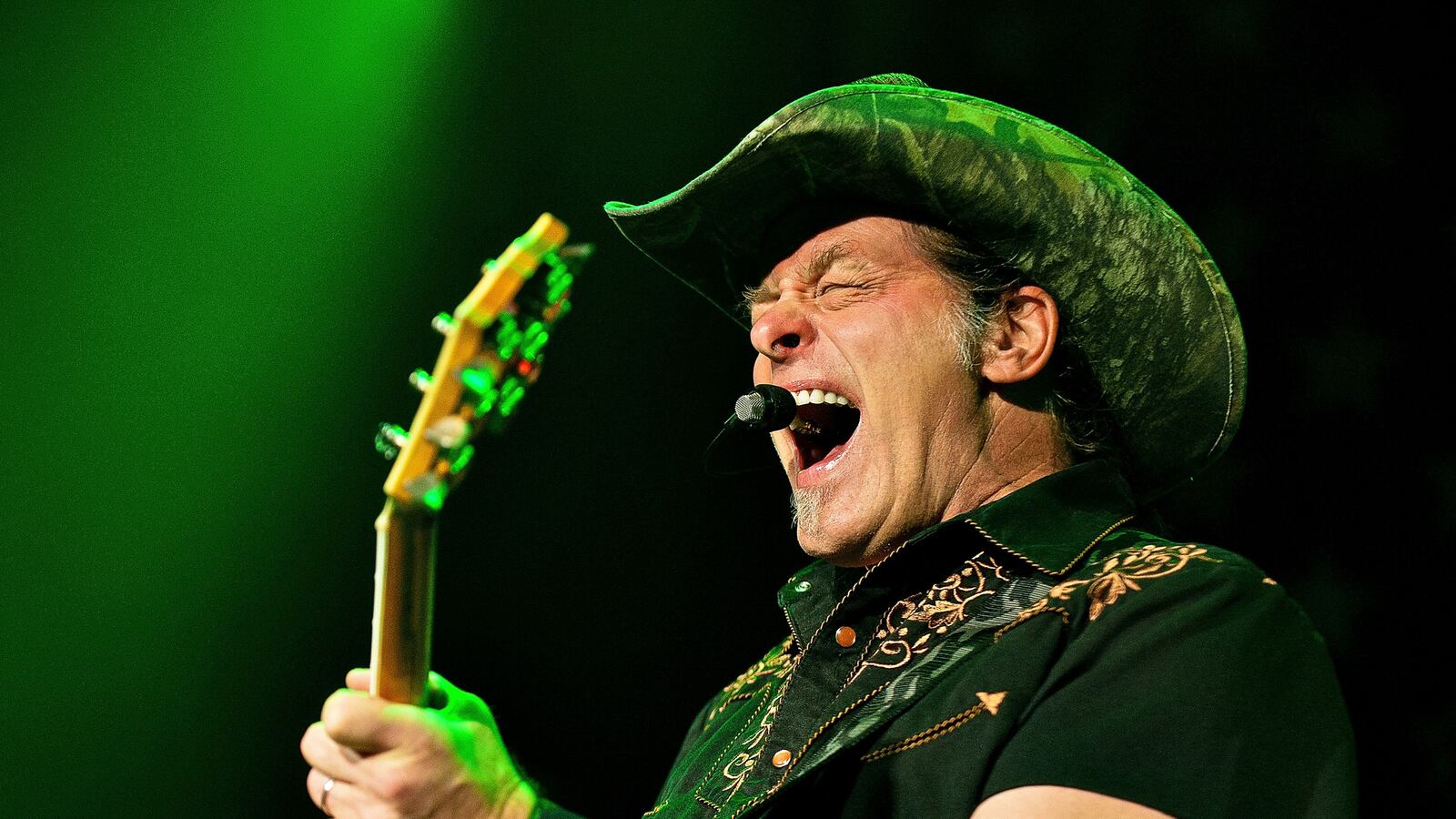Ted Nugent played my dad’s high school in 1968. As he plowed through what was then a terrifying, alluring setlist, the kids did something unthinkable. In fact, it was unprecedented, and strictly against the rules: They got up out of their seats, and ran down to the foot of the stage.
The Nuge paused, approvingly, between songs. But the air was pierced by an even more dangerous and unsettling sound—the sound of counter-revolution. In the rear of the auditorium stood the vice principal, an older woman possessed of commanding authority and not a compunction about using it. “Boys and girls!” she shouted. (She never shouted.) “You get back in your seats right! Now!”
Was it panic in her voice? The kids’ heads snapped around in an instant, then back to the Nuge, who glowered out from above.
The SixtiesTM were happening right there in front of them. Stifling convention versus crude rebellion. What was the Nuge going to do?
“Hey,” he said into the microphone. “Somebody tell that bitch to shut the fuck up.”
Something—it was hard to say exactly what—happened to the vice principal’s face. Nobody ever spoke to her like that; not at school, certainly, and probably not once in her life. Shattered completely, she crumbled toward the exit and disappeared.
The kids stayed at the foot of the stage, and the music played on.
That is the context I keep revisiting amidst the condemnations that swirl this week around the Nuge. He has called the president of the United States a “subhuman mongrel,” and only Hunter S. Thompson can do that. Famous Republicans like Rand Paul and Ted Cruz have had to go on record against the Nuge, or his opinion, anyway, which, after all, has no respectable place in American politics. (And he did offer something of a semi-apology on Friday.)
The reaction of many conservatives, however, is frustration of a kind not tinged with embarrassment. For the likes of Breitbart’s John Nolte, the most important thing about the political reaction to Nugent is the media’s partisan double standard. “Maher calls Palin c**t. Nugent calls O mongrel. Maher never held against Dems. Nugent held against GOP. That’s the issue,” he tweeted at Matt K. Lewis, who had just written a column for The Daily Caller about “why conservatives are always defending the indefensible.”
If you’re anything like me, your reaction to Nolte’s charge might have been something like: “Wait. Maher slams the left often enough that media figures can hardly use him to beat up on Democrats.” But on reflection, Nolte has a point. It’s just not what he thinks it is.
Music used to be the most powerful media platform in the world. If you were a rock star, people listened—to your music, yes, but also your words. To the kids, rapidly coming of age, you were a hero. You were a revolutionary. You were superhuman. At the same time, “the media” was… three old dudes on three black and white TV channels.
Now, the media is the star. The media provides the spectacle. The media controls the spectacle. It throws scraps to the few famous musicians who haven’t grown old, sold out, or gone soft. Some of the older ones, like Queens of the Stone Age frontman Josh Homme, still remember enough of the old days to rail impotently against the entertainment-industrial complex and the younger new bands laughing all the way to the bank.
What Homme may or may not understand is that, unless and until a new wave of crazed, authentic artist-rebels rises up from the great unwashed, those days of musician supremacy are dead and gone. In 1968, Ted Nugent was a lightning rod, a personification of transformational freedom. Well aware that rock music has lost its world-historical mojo, the Nuge is merely going where the action is—the 60-second news cycle.
But he’s been off his game for decades. By remarkable contrast, younger musicians who really go to the mat for political controversy can become superstars. Just ask Pussy Riot. It’s not the music that has them stunning Brooklyn hipsters and getting filmed by VICE. It’s the fact that they’re breaking news.
Sadly for the Nuge, hurling racially charged epithets at the president is not really breaking news. It might move the needle among the professionally outraged, but the wider world has bigger, more personal problems to deal with.
Sadly for America, “the news,” which now means “whatever the media’s talking about,” has taken the scepter of cultural power from pop music. The biggest voice in America isn’t a rock star’s—it’s the guy who interviews the ostensible stars, Howard Stern, the brilliantly self-proclaimed King of All Media. And he’s a dinosaur!
Sadly for conservatives—this is where Nolte’s point comes in—there’s still no media personality bashing the Republican Party from the right who compels people to take him or her seriously. For a hot minute, Rush Limbaugh enjoyed that status in the ‘90s. Sarah Palin never even came close. I think the only person to do it for any length of time is Pat Buchanan, and he, like Nugent, is a relic of an era as dead as his old pal Hunter Thompson.
Unfortunately for those who complain that Nugent bears the brunt of media bias, it’s not the media’s job to make way for conservatives who can protect themselves from criticism by whacking the GOP on occasion. The media’s job is to make stars, end of sentence, end of paragraph.
Can a bona fide star today be politically right of center?
You’re right to ask. Even though the answer is probably no, the real question is who’s going to be the stars of tomorrow. Because my guess is, they just might surprise you. The thing about the power of fame is, it usually dies before you do. Whether you’re Ted Nugent or the Liberal Media, you won’t be on top forever. One day you’ll be telling yourself stories about what happened generations ago—and the celebrities of the future will be blowing people’s minds, in ways you couldn’t possibly imagine.




